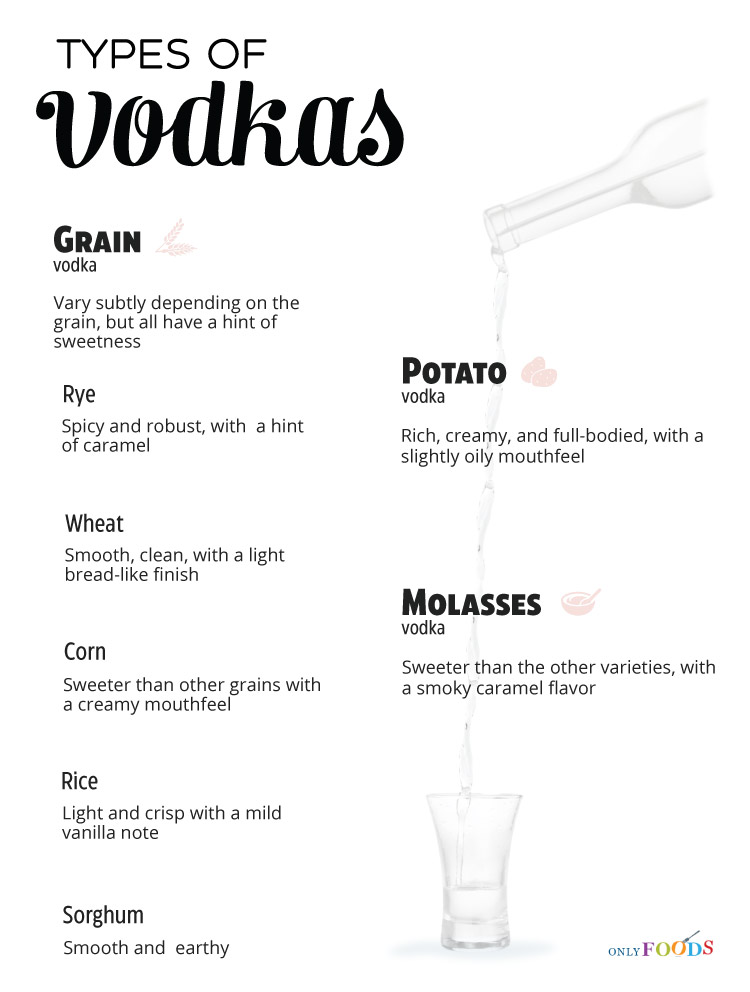Types of Vodka
Vodka is one of the most versatile spirits, with its popularity easily matching that of common liquor choices like beer and whiskey. Traditionally distilled from fermented grains and potatoes, vodkas have a clean, neutral taste that makes them ideal for mixed drinks and cocktails.
It is more common to drink it neat or on the rocks in countries like Russia and Poland, where vodka is part of the culture and traditions. In other places, including the U.S., it is more popular as the main ingredient of famous cocktails, such as Vodka Martini, Cosmopolitan, and Bloody Mary.
Unlike liquors like beer, whiskey, and wine, vodka has no international standardization. Though the basic production method remains the same, different countries have their own rules and regulations for what can be labeled as vodka. For instance, the standard ABV for vodkas has been considered to be 40% since the 1890s. But now, the EU-established regulations require vodka to have an ABV of 37.5%, while in the US, it still must have a 40% ABV to be labeled as vodka.
Classifying the Different Types of Vodkas
Numerous varieties of vodkas are accepted and can be classified into traditional, artisanal, and flavored vodkas. Even traditional vodkas come in multiple varieties, and the classification mainly depends on the country of origin and basic ingredients.
Based on Country of Origin
Vodka originated in Central and Eastern European countries, with the “Vodka Belt” traditionally including Poland, Russia, Sweden, Ukraine, Belarus, the Baltic states (Estonia, Latvia, Lithuania), Finland, Norway, Iceland, and Slovakia. Today, Poland, Russia, and Sweden remain among the largest vodka producers. Other countries, such as France and the United States, have also become leading producers, known for their distinct vodka styles.
Vodka production methods can vary, with some modern distillers in countries like France and the U.S. using extensive filtration techniques — such as charcoal filtering after distillation — aiming for a smoother finish, though this practice is not exclusive to these regions. Traditional vodka producers often prefer minimal filtering to preserve the unique characteristics of the base spirits.
Based on Ingredients
Most of the countries in the vodka belt remain below sub-zero temperatures all year, which makes it impossible to grow grapes, rendering wine-making difficult. So, they started distilling spirits from grains and potatoes as these were easily available.
Today, apart from potatoes and grains like rye and wheat, vodkas are made from molasses as well. Although vodka producers aim for a neutral flavor, the primary ingredient still imparts subtle characteristics to the finished product. Here are the main types of vodkas based on what they are distilled from, along with their characteristics.
Other base ingredients often used for making vodka include grapes, soybeans, and sugar beets. Modern vodkas may even have sugarcane, honey, and maple sap as the base material for distilling spirit.
Many U.S. brands distill neutral grain spirits and filter, bottle, and distribute their products. As a result, there is ongoing debate about whether these should be considered “traditional” vodkas. There’s still plenty of debate over what truly qualifies as “vodka,” especially when it comes to tradition. Vodka Belt countries often push for stricter definitions, arguing that only spirits made from grains (like wheat and rye), potatoes, or sugar beet molasses should get the official label.
FAQ
All vodkas are generally gluten-free, whether made from grains like wheat or other ingredients such as potatoes or molasses. The distillation process typically removes any traces of gluten, resulting in a final product that is gluten-free. Flavored vodkas, on the other hand, may contain gluten if flavorings or additives are introduced after distillation. So, it’s always wise to check the product label, particularly for those with health sensitivities.
Pure vodkas made from high-quality ingredients and those that undergo multiple distillations are generally less likely to cause hangovers because they contain fewer impurities, such as congeners, which can worsen hangover effects. However, it’s important to note that vodkas can lead to hangovers if consumed in excessive amounts; additionally, individual tolerance to alcohol varies significantly.

